Share
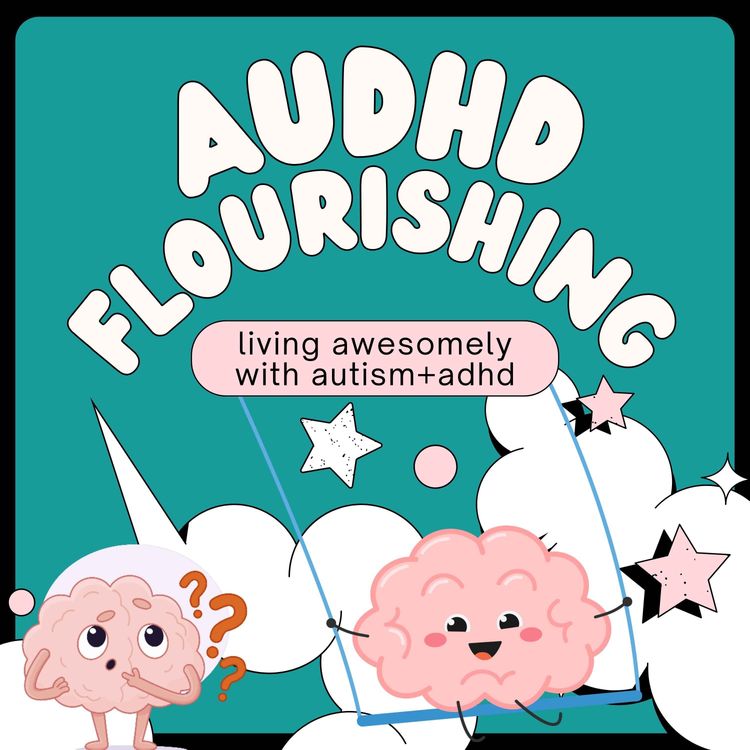
AuDHD Flourishing
74 Gratitude in Uncertainty
•
Thinking seasonally about gratitude in the context of..... everything happening right now.
It's easy for my brain to want to solve every problem in the world.
But I don't want to do the opposite of becoming entirely insular and only focusing on myself.
I've found gratitude to be a way I can be more deeply interconnected (and in my case, add more reasons to want to live).
Mentioned in episode:
- Ep 25 The Power of Honest Gratitude
- Ep 72 Feeling Safe in Uncertainty & Chaos
- Unmasking Autism book by Devon Price (affiliate link)
Resources:
- Transcript Doc
- Email Newsletter
- Like Your Brain community space
More episodes
View all episodes

128 AuDHD Parenting
24:38|Parenting as an AuDHDer is challenging and misunderstood. Many parents I speak to are near or in burnout at any given time, especially if they had kids before discovering their neurotype (which is common). This episode is based not on my experience as a parent, but my experience having spoken and heard from many AuDHD parents, and what I see working for them.This is in part a follow up to last week's interview with Julie M GreenMentioned in episode:Book Good Inside by Dr Becky Kennedy* (and her Instagram)AuDHD Flourishing resources:Transcript Doc (often a few weeks behind, but we do catch up!)Mattia's NewsletterLike Your Brain community space (Patreon/Discord)*affiliate link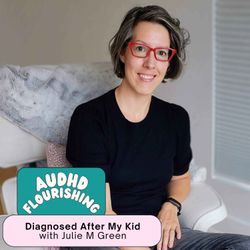
127 Diagnosed After My Kid with Julie M Green
55:48|Julie M. Green is the author of Motherness: A Memoir of Generational Autism, Parenthood, and Radical Acceptance. She shares about how difficult early parenthood was, how different her autism presents versus her kid's, and navigating school and regulation skills.The book is a vulnerable look at some of the challenging and lighthearted moments of raising an autistic kid.Connect with Julie:Her book Motherness: A Memoir of Generational Autism, Parenthood, and Radical Acceptance Website: juliemgreen.caInstagram: https://www.instagram.com/juliem.greenSubstack: https://theautisticmom.substack.com/AuDHD Flourishing resources:Transcript Doc (often a few weeks behind, but we do catch up!)Mattia's NewsletterLike Your Brain community space (Patreon/Discord)*affiliate link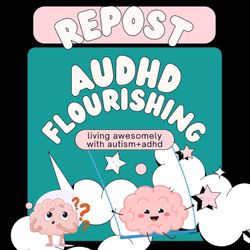
Surviving Out of Spite - Repost
13:03|You deserve to survive this. Please stay.And if staying out of spite helps you, it has gotten me through some tough times.My Medium article, "Please Stay, We Need You"Repost of ep. 75Crisis Resources:USA-based anonymous crisis chatInternational crisis linesVarious types of crisis resources in about 10 countriesResources:Transcript DocEmail NewsletterLike Your Brain community space
126 Slow Days Make Flow Days
23:08|Flow is pleasant and often productive. It may also require some guardrails to be healthy for AuDHDers, especially those of us on the very monotropic side. It's often easy for us to get into flow and hyperfocus, and to stay in them until they stop feeling pleasant.Adding in more rest and recovery, including preparatory rest as needed, can really help!It's also okay to avoid flow states for a period of time, as I am right now for the most part.Do Less program for 2026 (starts Jan 15, reach out by Jan 7)Email mattia@mattiamauree.com with application answers, and/or any questionsAuDHD Flourishing resources:Transcript Doc (often a few weeks behind, but we do catch up!)Mattia's NewsletterLike Your Brain community space (Patreon/Discord)
125 Autistic Play Saves Lives with Max Alexander
58:54|Max Alexander is an artist and play worker who has mapped some common shapes of autistic play. He's passionate about neuro-affirming play for all ages.Play is both a healing tool, and can help prevent some of the effects of trauma (we touch on this lightly, a concept I learned from Linda Thai) One possible way to apply the play styles is noticing which ones speak to you, and which ones you're already engaging in, then leaning into those.The ebook is free, and it's a quick and excellent read!Apologies for the audio quality. Max was using a headset and didn't have an actual microphone, so I did the best I could to clean it upDo Less program for 2026 (starts Jan 15, reach out by Jan 7)Email mattia@mattiamauree.com with application answers, and/or any questionsConnect with Max:Max's book, The Joys and Shapes of Autistic PlayMax's Substack, Play RadicalAuDHD Flourishing resources:Transcript Doc (often a few weeks behind, but we do catch up!)Mattia's NewsletterLike Your Brain community space (Patreon/Discord)
124 AuDHD Leadership Matters
16:27|AuDHD leadership touches on last week's interview with Dr Megan Anna Neff. And it goes beyond the visible leadership of creating content, or being in the public eye.AuDHD leadership can includebeing your authentic selfvisibly meeting your sensory needssharing what helps you (whether or not it's advice)Mentioned in episode:- Do Less program for 2026 (starts Jan 15, reach out by Jan 7)Email mattia@mattiamauree.com with application answers, and/or any questions- Blog post with business episodesAuDHD Flourishing resources:Transcript Doc (often a few weeks behind, but we do catch up!)Mattia's NewsletterLike Your Brain community space (Patreon/Discord)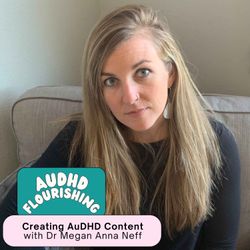
123 Creating AuDHD Content with Dr Megan Anna Neff
55:02|Dr Megan Anna Neff is a neurodivergent therapist and thought leader, who became popular in 2022 with their "Misdiagnosis Monday" series. Their thoughtful content has helped many thousands of AuDHDers and other neurodivergent folks feel seen and understood.Today we talk abouthaving a small business as a neurodivergent person (including PDA at the end)the questions and concerns we have about creating helpful content, and not causing harmhow weird it is to be perceivedConnect with Megan Anna & Neurodivergent Insights:Free Help Me Stay Plan (for SI)Website: neurodivergentinsights.comDivergent Conversations Podcast: www.divergentpod.comInstagram: www.instagram.com/neurodivergent_insights/YouTube: https://www.youtube.com/@NeurodivergentInsightsTVDo Less program for 2026 (starts Jan 15)AuDHD Flourishing resources:Transcript Doc (often a few weeks behind, but we do catch up!)Mattia's NewsletterLike Your Brain community space (Patreon/Discord)
122 Do Less (of what you don't want, to make room for what you do)
19:58|Doing less of what's harming you opens up time and energy. You can enjoy that as rest, and if desired, eventually fill it in with what you do want.AuDHDers often need to move at a slower pace, in many ways. Sometimes we then have creative bursts that move fast... but the space comes FIRST!Mentioned in episode:Do Less program for 2026 (starts Jan 15)book, Anti-Diet by Christy Harrison (affiliate link)AuDHD Flourishing resources:Transcript Doc (often a few weeks behind, but we do catch up!)Mattia's NewsletterLike Your Brain community space (Patreon/Discord)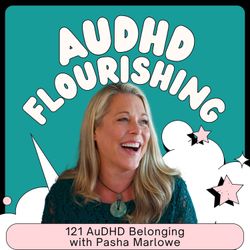
121 AuDHD Belonging with Pasha Marlowe
01:04:48|Pasha joins again to talk about what they've learned in the past two years since last being on the show! We talk about belonging, triggers in relationships, and much more.She also shares the ableism behind the scenes of an autism training from a large (unnamed) org.Mentioned in episode:Pasha's website & LinkedInInstagram @neuroqueercoachTikTok @neuroqueercoachPasha's YouTubeAuDHD Flourishing resources:Transcript Doc (often a few weeks behind, but we do catch up!)Mattia's NewsletterLike Your Brain community space (Patreon/Discord)